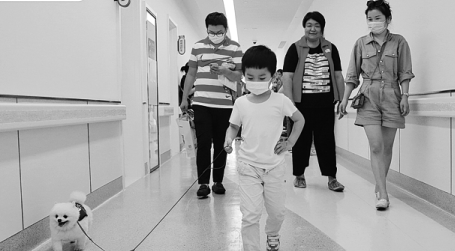Modern life, sanity and why you should talk to your dog


Wu compares raising pets to the concept of life education. This is not only of educational significance, he says, but provides important learning content for us as human beings in social life.
"There is a more important thing, which is to let people learn how to dedicate, contribute their own strength, and reflect their own value."
However, for the thousands of people willing to believe in the power of animal therapy there is a legion of skeptics who pooh-pooh the idea.
Cui Jianlian, a professor at the Veterinarian Teaching Hospital of China Agricultural University in Beijing, says that "even though a lot of research confirms the benefit of animal-assisted therapy, theories to support and explain the reasons are sparse".
Deep skepticism has made Wu's effort to persuade people otherwise a very tough sell. His job is not made any easier in a society where pets are widely prohibited from entering premises.
"This is one of the biggest pains for many pet owners," Wu says. "You can't even find a proper place to do socialized environmental adaptation pet training. "There are many places you're not allowed to go into, such as supermarkets, shopping malls and parks. So how are you supposed to adapt to different situations by, for example, taking them into crowded places?"
Wu says that in his battle to change hearts and minds over the past eight years, things have slowly begun to change. CapitaLand, a shopping mall in the Minhang district of Shanghai, recently invited Wu to present his therapy dogs there, about the time of International Children's Day.
On the day of the event a variety of interactive activities allowed children to experience a different kind of fun with the dogs. With such tiny steps, Wu says, he is optimistic about shopping malls in the city becoming more friendly to pets.
Events like the Shanghai one help raise public awareness about the need to protect animals and of how important they are in the social fabric, Wu says, and mean a lot to those like him working to protect animals.
"We have dogs that help the disadvantaged, and we devote our time and energy to them, and we hope that in turn more people will start to care about the rights of these animals. It's a process in which everyone is rewarded."
Lu Yu, of Shanghai, who loves small animals, had been looking for various channels to do voluntary activities such as animal rescue. It eventually dawned on her that no matter how much effort she poured into the task, only committed animal lovers seemed to be receptive to the message, she says.
One day she met Wu at a pet show promoting his charity therapy dog project and realized that those who help any small animal around them also help others realize the value of such animals.
Wu has also established a "time bank" program to stimulate a reward mechanism for therapy dogs.
"This reward mechanism gives them the chance to have a free bath, health check, and an opportunity to enter the public space with volunteers. The working time of these dogs is limited, especially since their life span is very different to that of people, and we are collaborating with institutions so we can extend the life of pets."
Several weeks ago his team signed a collaborative agreement with the stem cell company Yinfeng Biotechnology and Southeast University in Nanjing to provide medical treatment and insurance for therapy dogs that have served a certain number of years and go into retirement.
Wu says one-third of the therapy dogs in his team are made up of former strays. They may have been abandoned and rejected by the world, but after thorough training they return to the fold, ready to help those in need.
From that point "their love only grows", he says.
zhanglei@chinadaily.com.cn




































